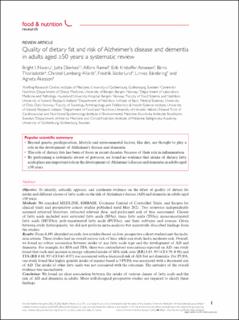| dc.description.abstract | Objective: To identify, critically appraise, and synthesize evidence on the effect of quality of dietary fat intake and different classes of fatty acids on the risk of Alzheimer’s disease (AD) and dementia in adults aged ≥50 years.
Methods: We searched MEDLINE, EMBASE, Cochrane Central of Controlled Trials, and Scopus for clinical trials and prospective cohort studies published until May 2021. Two reviewers independently screened retrieved literature, extracted relevant data, and performed risk of bias assessment. Classes of fatty acids included were saturated fatty acids (SFAs), trans fatty acids (TFAs), monounsaturated fatty acids (MUFAs), poly-unsaturated fatty acids (PUFAs), and their subtypes and sources. Given between-study heterogeneity, we did not perform meta-analyses but narratively described findings from the studies.
Results: From 4,491 identified records, five articles (based on four prospective cohort studies) met the inclusion criteria. Three studies had an overall serious risk of bias, while one study had a moderate risk. Overall, we found no robust association between intake of any fatty acids type and the development of AD and dementia. For example, for SFA and TFA, there was contradictory associations reported on AD: one study found that each unit increase in energy-adjusted intake of SFA (risk ratio [RR] 0.83, 95%CI 0.70–0.98) and TFA (RR 0.80, 95%CI 0.65–0.97) was associated with a decreased risk of AD, but not dementia. For PUFA, one study found that higher quintile intake of marine-based n-3 PUFA was associated with a decreased risk of AD. The intake of other fatty acids was not associated with the outcomes. The certainty of the overall evidence was inconclusive.
Conclusion: We found no clear association between the intake of various classes of fatty acids and the risk of AD and dementia in adults. More well-designed prospective studies are required to clarify these findings. | en_US |

